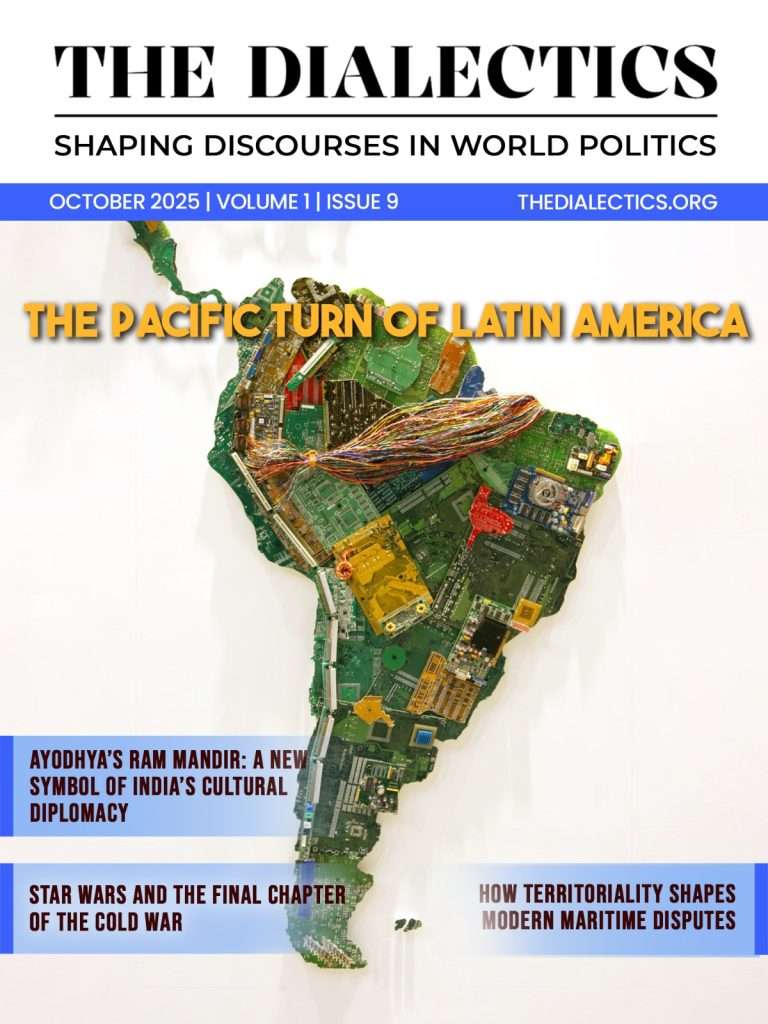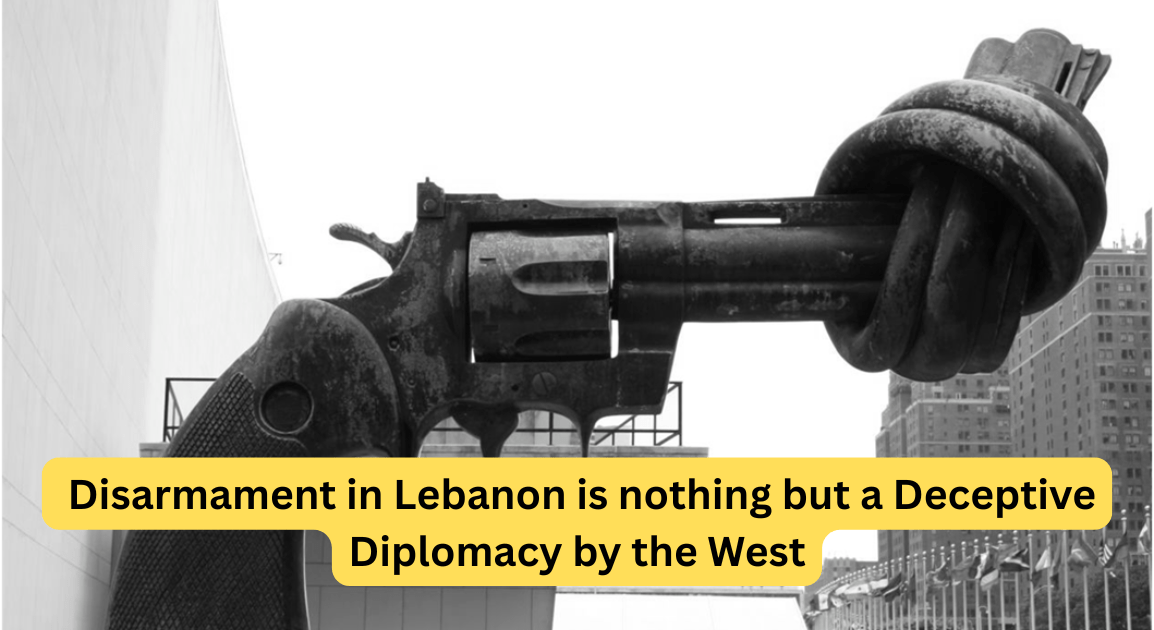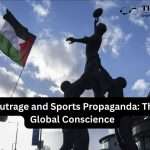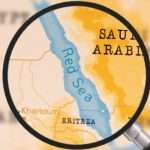The Lebanese state is navigating a precarious paradigm. It has embarked upon an unprecedented path to disarm all the non-state entities in Lebanon. Essentially, this pursuit towards disarmament or monopolization of weapons and regulation of legitimate force resonates with the concept of Weberian state as ideated by the German Sociologist, Max Weber. He emphasized that the state is the sole legitimate entity entitled to utilise legitimate force in order to ensure its sovereignty. Moreover, this Lebanese mandate is in accordance with the UNSC Resolution 1701 as well as the 1989 National Reconciliation Accord aka the Taif Accords, which ensures state monopoly over weapons that precisely prioritizes disarming of all the non-state entities in Lebanon and most notably the Hezbollah militias.
Albeit, this policy is instrumental in reasserting the Lebanese sovereignty, this particular pursuit towards disarmament reeks of a deceptive diplomacy of the global players who are keen to meddle in the internal politics of Lebanon to secure selfish pursuits that caters their agenda. It is imperative to trace their grand strategy in the region. This article scouts the geopolitical calculus of these global actors embedded in the camouflaged diplomacy of disarmament in Lebanon to maneuver the wider West Asian politics.
External Influence In Internal Policies
While Beirut is still budding out of the financial collapse, this crisis has leveraged a pathway for the international creditors like the IMF, World Bank and global players like the United States (US) and France along with the Gulf states who lend legitimacy to their favourable Lebanese leaders and in return these leaders advocate the external dictates in Lebanon. This Disarmament drive demonstrates how the economic devastation jeopardises the Lebanese political arena where credible legitimacy is simply transactional and hinges with external actors.
The Lebanese cabinet under the auspices of President Joseph Aoun and Prime Minister Nawaf Salam approved the strategy presented by the Lebanese Army Commander Rodolphe Haykal to bolster the state monopoly over weapons and disarmament of all the non-state entities in Lebanon. Albeit, Aoun (who formerly served as the Chief of Staff) in his inaugural Presidential oath explicitly stated his intention to address the internal fractures to strengthen their fragile institutions and uphold its international standing at the global stage. However, the major momentum to this mandate was firmly underscored by the US Envoy Thomas Barrack in his proposed ‘Roadmap’ for Beirut.
In a similar vein, to catalyze this initiative, the US administration in late September disbursed security aid worth $190 million for the Lebanese Armed Forces (LAF) and another $40 million for the Internal Security Forces (ISF). This financial aid indeed reflects the US commitment to ensure robust state apparatus that weaves a viable security framework in this volatile region. This fund also fuels the strategic security calculus of the US further in the Levant that coincides with its West Asian associates who remain keen to kindle this Lebanese fervour of Disarmament for their selfish interests.
On the other hand, Hezbollah is still reeling from last year’s hostility with Israel, however, the Hezbollah deputy head Naim Qassem is resolute regarding the fervor of ‘Resistance’ and explicitly dares the US and its puppets in the region against Disarmament. Moreover, Hezbollah has hinted towards a potential sectarian crisis that can severely destabilize the fragile sectarian fabric of the country. It is likely that the internal dynamics is likely to stifle this discourse. Thus, their respective agendas seep through the fragile crevices and push Lebanon at the verge of another civil crisis.
REGIONAL RECONFIGURATIONS:
Israel And The Gulf States
Primarily, the most immediate imperative of disarming the non-state entities in Lebanon including the Palestinian faction suits the security calculus of Israel. The Lebanese Israel border remains marred with militant hostility. A potential disarmament emboldens the security pursuits and reinforces the pre-emptive and deterrence doctrine of Israel. Securitization of this northern frontier liberates the Litani and its peripheries that host Hezbollah dens and yields Israel defensive depth in the region. Besides, this also undermines the might of Shia militancy that caters to the Arab agenda in the region. It ultimately amplifies the potential extension of Abraham Accords that would accelerate a comprehensive Arab-Israeli convergence in the region. Thus, the US is keen to operate this strategic lever to legitimize the existence of its most formidable ally in West Asia and orchestrates a comprehensive understanding among its allies i.e. the Tel Aviv and the Gulf monarchs. Moreover, their coalesce imperatives goes far beyond Lebanon; further into the landscape of Levant.
SYRIA
Beyond Beirut, the foremost coincidence emerges from Damascus that is embracing a new ‘deen’ with the advent of a Sunni supremacy under the Presidency of Ahmed al Sharaa who showcases a pro-gulf and pro Arab sentiment. In addition, there is a keen tilt towards the West while Damascus is drifting away from the revolutionary shiism of Iran. This reorientation comes amid economic integration and diplomatic recalibration in the post Assad era where Sharra seeks to stabilize Syria and has also set a pragmatic tone with Israel. This essentially reconfigures the regional balance of power in favor of Washington as well as Tel Aviv. Moreover, it bolsters the Sunni clout in Syria as Sharra is keen to bridge a Syrian bonhomie with the Arab states in the region. At this hour, both the Lebanese and the Syrian regime complimented their strategic calculus in the region. Thus, this Disarmament initiative is not merely coincidental and rather it seamlessly coincides with the wider calculus of Washington and its West Asian allies like Israel and the Arab juggernauts.
IRAN
Moreover, this mandate has sent shockwaves far beyond the borders of Beirut. Tehran has remained the most ardent state opponent of this disarmament measure. The Iranian Foreign Minister Abbas Araghchi has reaffirmed Hezbollah’s stance against disarmament and have emphasised that they ‘support any decision the group makes’. Essentially, this mandate debacles the Iranian influence in the Levant as it intends to capitulate revolutionary Shiism from Lebanon. As noted by the head of West Asia Initiative at the ORF, Kabir Taneja, Hezbollah is too vital for Iran to face such a fate, and Tehran will do everything within its power to keep the militia alive, even as it grapples with severe capacity depletion and other challenges. While Hezbollah’s military apparatus has been crucial in directing the Israeli forces at bay, simultaneously, it has extensively leveraged the internal politics of Lebanon through Shia influence in the Levant largely. Hence, Iran has indirectly influenced the dynamics of the region and has imperiled the geopolitical calculus of Western players in West Asia for ages. However, this latest Disarmament discourse dwindles Tehran’s proxy architecture in Levant.
GAZA
The contiguous imperative continues to seep further down south into the Gaza Strip where Washington is stipulating a stern norm through its disarmament discourse. President Trump’s latest 20 point peace proposal for Gaza explicitly stipulates disarmament of Hamas as a prerequisite for peace. It remains the most contentious clause amid all other stipulations. Essentially, this serves the twin strategy of the US in the region.
Firstly, it effectively destabilizes the forward defence capacities of Iran as it cripples its militant extension by disarming Hezbollah in Lebanon or Hamas in Gaza.
Secondly, it suits the strategic calculus of Washington’s allies in the region. This weaves a mutual deterrence architecture among Israel and the Arab state who perceive potential security dilemma emanating from Iran, despite the Saudi Iran detente. Thus, they conveniently camouflages Tehran as the typical scapegoat to bolster their deceptive narrative.
CONCLUSION
Although this Disarmament drive is a significant milestone towards a cohesive society. However, it is Deceptive diplomacy that drives the Disarmament discourse in Beirut. The Lebanese fate is being inevitably maneuvered by the global and regional players who seek to fundamentally alter the landscape of Levant that satiates their selective interests. The coalesced approach of the US and its West Asian associates substantially sidelines the Iranian influence in Lebanon and leverages the vested players considerable geopolitical foothold in the Levant. Albeit, disarmament of non-state entities is an essential prerequisite but at this hour Lebanon must tread cautiously to uphold its sovereign agenda and eliminate any external meddling in its internal politics as it lies susceptible to slide into another civil strife soon.




